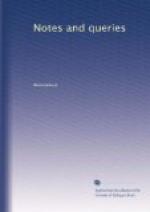The readers of Macaulay will be familiar with the term “heart-money” (History, vol. i. p. 283.), and the amusing illustrations he produces, from the ballads of the day, of the extreme unpopularity of the tax on chimneys, and the hatred in which the “chimney man” was held (i. 287.) but this was a different impost frown that spoken of above, and paid to the king, not to the cathedral. It was collected for the last time in 1690, having been first levied in 1653, when, Hume tells us, the king’s debts had become so—
“Intolerable, that the Commons were constrained to vote him an extraordinary supply of 1,200,000l., to be levied by eighteen months’ assessment, and finding upon enquiry that the several branches of the revenue fell much short of the sums they expected, they at last, after much delay, voted a new imposition of 2s. on each hearth, and this tax they settled on the king during his life.”
The Rev. Giles Moore, Rector of Horstead Keynes, Sussex, notes in his Diary (published by the Sussex Archaeological Society),—
August 18, 1663.—I payed fore 1 half yeares earth-money 3s.
Other notices of this payment may be supplied by other correspondents.
E. VENABLES.
Holland Land (Vol. ii., p. 267.).—Holland means hole or hollow land—land lower than the level of contiguous water, and protected by dykes. So Holland, one of the United Provinces; so Holland, the southern division of Lincolnshire.
C.
Caconac, Caconacquerie (Vol. ii., p. 267.).—This is a misprint of yours, or a misspelling of your correspondents. The word is cacouac, cacouacquerie. It was a cant word used by Voltaire and his correspondents to signify an unbeliever in Christianity, and was, I think, borrowed from the name of some Indian tribe supposed to be in a natural state of freedom and exemption from prejudice.
C.
Discourse of National Excellencies of England (Vol. ii., p. 248.).—A Discourse of the National Excellencies of England was not written by Sir Rob. Howard, but by RICHARD HAWKINS, Whose name appears at length in the title-page to some copies; others have the initials only.
P.B.
Saffron Bags (Vol. ii., p. 217.).—In almost all old works on Materia Medica the use of these bags is mentioned. Quincy, in his Dispensatory, 1730, p. 179., says:—
“Some prescribe it (saffron)
to be worn with camphire in a bag at the
pit of the stomach for melancholy;
and others affirm that, so used,
it will cure agues.”
Ray observes (Cat. Plant. Angl., 1777, p. 84.):
“Itemque in sacculo
suspenditur sub mento vel gutture ad dissipandam
sc. materiam putridam et venenatam,
ne ibidem stagnans, inflammationen
excitet, aegrotumque strangulet.”




